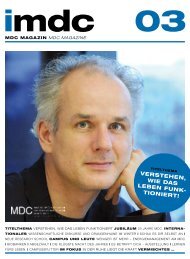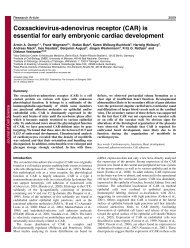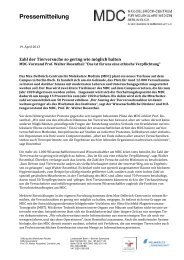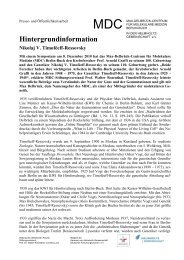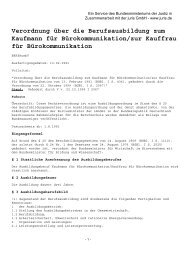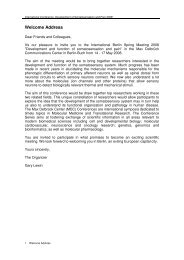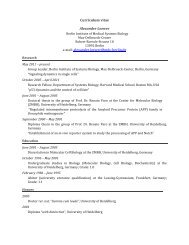of the Max - MDC
of the Max - MDC
of the Max - MDC
You also want an ePaper? Increase the reach of your titles
YUMPU automatically turns print PDFs into web optimized ePapers that Google loves.
Figure 1. S100A4 is a newly identified target gene <strong>of</strong> <strong>the</strong> β-catenin/TCF signaling<br />
pathway.<br />
β-Catenin/TCF signaling controls <strong>the</strong> expression <strong>of</strong> <strong>the</strong> metastasis-promoting gene<br />
S100A4. S100A4 acts intracellularly via transcriptional regulation <strong>of</strong> target genes, and<br />
by protein interaction with binding partners. Functions <strong>of</strong> extracellular S100A4 are<br />
mediated via transmembrane receptors.<br />
Figure 2. Clinical application <strong>of</strong> nonviral jet-injection.<br />
Jet-injection <strong>of</strong> LacZ-expressing plasmid-DNA into skin metastases <strong>of</strong> a melanoma<br />
patient (A) and injection site shortly after application (B). RT-PCR analysis <strong>of</strong> LacZmRNA<br />
expression in <strong>the</strong> tumor (C), verified by Western-blot analysis <strong>of</strong> LacZ-protein (D)<br />
Detection <strong>of</strong> LacZ-protein distribution within <strong>the</strong> tumor tissue by X-gal staining (E; as<br />
indicated by arrows).<br />
terns in human primary tumors, metastases, and mucosa <strong>of</strong><br />
colon cancer patients. We cloned <strong>the</strong> full-length cDNA<br />
sequence <strong>of</strong> this novel gene, referred to as MACC1. The<br />
encoded putative protein harbors domains for protein-protein-interaction<br />
and potential tyrosine phosphorylation<br />
sites. MACC1 expressions measured in primary colon tumors<br />
were found to be significantly higher in those cancers, that<br />
metachronously developed distant metastases compared to<br />
those tumors, which did not metastasize. Thus, MACC1 levels<br />
predict <strong>the</strong> probability to develop distant metastases<br />
linked to metastasis-free survival. Moreover, we identified<br />
an autoregulatory system <strong>of</strong> HGF-induced nuclear translocation<br />
<strong>of</strong> MACC1 that transcriptionally controls Met expression,<br />
<strong>the</strong>reby initializing and/or intensifying HGF/Met signaling<br />
downstream events. MACC1 induces proliferation,<br />
motility, and HGF-induced scattering in colon cancer cells.<br />
Transduction <strong>of</strong> both, MACC1 and Met siRNA, reverted <strong>the</strong>se<br />
effects. Following subcutaneous, orthotopic, and intrasplenal<br />
transplantation <strong>of</strong> MACC1-expressing tumor cells in<br />
mice, enhanced tumor growth and liver metastases were<br />
found. MACC1 mutants lacking protein-protein interaction<br />
domains lost <strong>the</strong>ir biological functions in vitro and in vivo.<br />
Activation <strong>of</strong> <strong>the</strong> Wnt/β-catenin pathway is frequently<br />
observed in colorectal cancers, and mutations <strong>of</strong> <strong>the</strong><br />
β-catenin gene were described as early and critical steps<br />
in tumor progression. We analyzed cell lines heterozygous<br />
or homozygous for gain-<strong>of</strong>-function and/or wildtype<br />
β-catenin. We identified S100A4 as <strong>the</strong> most regulated<br />
gene by gain-<strong>of</strong>-function β-catenin using a 10K microarray.<br />
Cell lines with gain-<strong>of</strong>-function β-catenin expressed up to<br />
60-fold elevated S100A4 levels, and displayed strongly<br />
increased cell migration and invasion. Transduction <strong>of</strong> both,<br />
S100A4 and β-catenin siRNA, knocked down <strong>the</strong>se effects.<br />
We demonstrated <strong>the</strong> direct binding <strong>of</strong> heterodimeric β-<br />
catenin/TCF complexes to <strong>the</strong> S100A4 promoter. Reporter<br />
assays confirmed <strong>the</strong> β-catenin-controlled S100A4 promoter<br />
activity. Fur<strong>the</strong>rmore, S100A4 expression was increased<br />
in human primary colon cancers, which later developed distant<br />
metastases, compared to tumors which did not metastasize.<br />
Colon tumors heterozygous for gain-<strong>of</strong>-function β-<br />
catenin showed concomitant nuclear β-catenin localization,<br />
high S100A4 expression, and distant metastases formation.<br />
Our results relate two pathways with important roles in tumor<br />
progression and metastasis, <strong>the</strong> β-catenin/TCF signaling pathway<br />
and S100A4, that controls motility and invasiveness.<br />
86 Cancer Research





